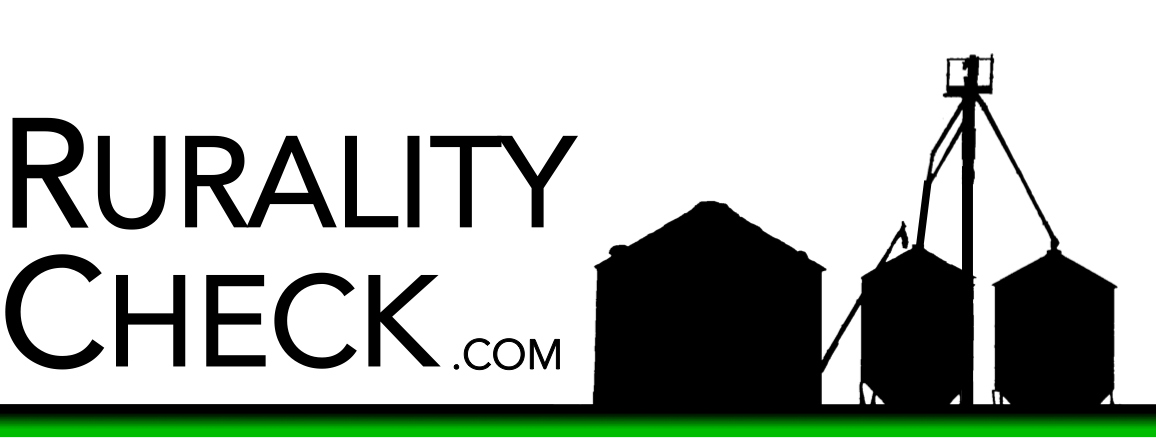
In progressive cities, “The Government” is viewed as a curious hybrid of queen bee and sacred cow. In rural areas, though, “The Government” is considered a swarm of killer bees, or the running of the bulls. Why? Why are rural people so reluctant to solve their problems using “The Government?”
One reason is that, in small towns, “The Government” doesn’t exist.
We will unroll two ideas here. First, as far as rural people are concerned, “The Government”—meaning larger systems of federal or state government—is obviously real, but it is in a faraway place. Second, the government that rural people do see is made up exclusively of people they know, making it silly to invent a name like “The Government” at all. This latter point seems to reflect how rural people view civic life.
First, distance. Rural people often have very little interaction with federal-level, or even state-level, politicians. During up-ticket campaigns, politicians typically visit large cities for logistic reasons, as well as to get the biggest bang for their campaign buck. Indeed, time spent in a metropolitan area will attract crowds of would-be voters and television coverage, while a visit to Bumblezero will attract a short bus from the nursing home and the front page of the local paper, a week later. As a result of their being ignored in this way, and as a result of their geographic distance from capital cities, rural people typically follow federal- and state-level politics strictly via the media. The fact that this media is often produced in cities—with its inevitable focus on, you know, cities—only adds to the reminder of rural people’s distance from the government.
Things are easy to hate from a distance. When you’ve never seen politicians, have never felt like they were speaking about issues that you valued, and perhaps have lived your adult life thinking that your vote hasn’t amounted to much, it’s easy to blame a distant government for a wide range of problems, regardless if doing so is justified. It’s especially easy when your most direct contact with that distant government—paying taxes—is unpopular. By the time the federal benefits of Social Security and Medicare kick in, this thought pattern has been set, at least stereotypically.
So, as a result of taxation and lack of contact, many rural people view “The Government” as negative. The next point does not help the first: In rural areas, local government does not seem like “government” at all. Instead, it takes the form of meetings where everyone knows everyone, like on township boards or small-town city councils. This form of government is less distant, and harder to vilify.
My hometown, for example, has far fewer than 1,000 people. Our little city council includes literally about one percent of the people in town (i.e. about seven of 700). For a sense of scale, to achieve that same level of representation, the city council of New York City would have to be about 85,000 people. The city council of Fargo would be bigger than my entire hometown.
In tiny towns, everyone knows each of the council members. And the mayor. And the city clerk. Their kids are friends. They’re on the fire department together. Important for us here, people are less likely to openly criticize leaders when they know them, especially when anyone who would listen knows them, too. People who live in small towns may disagree with their civic leaders, of course, and may gossip a bit. But they can’t develop quite the hatred for city government the way they can develop it for a faraway entity like a state or nation—if they did, they wouldn’t have any friends left.
Also, and just as important, citizens of tiny towns have heard stories about the nonsense that city leaders have had to tolerate in the course of their duties. Real city leadership (regardless of size, from township to metropolitan area) is often a thankless job. Rural people know this, in no small part because they’re reminded of it in memorable ways, often in the form of stories that involve people they know. (For example, “Did you hear about the sewer pump on the east side of town? The Lofgrens burned it out when they plugged the line with condoms that they flushed down the toilet. The city council had to approve two grand to replace it. Shhh.”) As a result of these constant reminders of the zaniness of local government, people from small towns are slow to complain, if only because they don’t want to get stuck doing the job themselves.
So, the kind of government that resonates with rural people is a more tangible, grittier kind of government that is full of people they know, and whom they are loath to criticize. With that said, knowing all of the elected officials is one thing, but knowing everyone in the entire tax base is another. In tiny towns, where you know literally everyone, you might be less likely to hate your leaders, but you’re also less likely to demand that your friends and neighbors pay for much via taxes.
Neighborly relationships are based on some form of reciprocity. Here’s a whirlwind tour of a big idea: You borrow from your neighbors, but you also lend to them. They watch your house, but you also watch theirs. Neighborly relations exist this way across the spectrum of sizes of towns and cities, from you’ll-miss-it-if-you-blink railroad towns to large cities. Tellingly, though, those large cities are broken up formally into neighborhoods, and those neighborhoods are often further broken down informally into streets or blocks. The unit of an functional group/neighborhood/community can be defined as a group of people small enough where each member can keep track of his interactions with the other members. This is basic social science, I would guess.
With this in mind, either consciously or subconsciously, someone in a tiny town might lend his lawn mower to a mere acquaintance on the other side of town before someone in a city might lend his lawn mower to a “neighbor” two blocks over. There’s an accountability in the tiny town because of the size of the group—you won’t screw anyone if your own relationships (e.g. social interactions or kids’ friendships) would suffer as a result. In large cities, this accountability disappears. As soon as the group gets big enough where not everyone can keep track of the relationships, the city becomes more like an anonymous, concrete jungle. You’re more likely to act selfishly in this jungle when you won’t be held accountable by your friends and neighbors, or your kids’ friends and classmates. That’s the difference in small towns: it’s not that people are nicer, but rather that people are scared that someone they know will find out. That’s much more likely in rural areas than in the city.
As mentioned, this is a big idea, and we will discuss in greater detail elsewhere. For now, though, suffice it to say that, in small towns, local government functions more like a neighborhood meeting than a statehouse. When everyone knows everyone, the dynamic changes compared to “The Government.”
Part of that dynamic is this: When you know everyone in the government and in the entire tax base, you’re less likely to demand things from them. Said another way, you demand things from your government—as if you’re entitled to them—only when you can act as if you’re demanding it from “Someone Else.” In small towns, you don’t demand a new road when this one works fine, because there isn’t Someone Else to pay for it. You would pay for it. Your neighbor would pay for it. Everyone would pay for it. When you have that kind of skin in the game, and when such a large percentage of the skin in that game is yours, many issues suddenly becomes less urgent, or less of an entitlement. You won’t demand that your road get fixed when it’s actually okay, because you don’t want everyone else to see what you’re doing and do the same, as if out of spite. Overall, you don’t demand anything from your government what you wouldn’t want others to demand of you. Otherwise, the demands can expand quickly.
And if the demands expand quickly when we’re talking about things like a road or new park benches, then they absolutely explode when we’re talking about things like, well, so many things on the progressive wish list. Let’s ignore the sense of scale for a minute and talk about some things on that list. Like “free college.” Economics aside, I wouldn’t ask a small-town government to pay for my kid’s college tuition, because I see Jeff and Mindy over there, and they’ve got nine kids, and most of them are dumb as soup and twice as lazy. I don’t want to be on the hook if they come knocking for the same thing. (And I know their kids from Cub Scouts, so I can say firsthand that they’re lazy, even for kids. Government works differently when you don’t need to stereotype because you actually know people.) “Universal health care” is similar. I wouldn’t dare ask a small-town government to pay for my medical bills, even if my medical condition was a freak, unforeseen accident of genetics, because I see Steve over there, large as an elephant calf, maxing out his steel chair, who hasn’t exercised since high school except to hop onto a barstool every night, drinking straight Jack and chain-smoking the cheapest, biggest cigarettes he can fit between his sausage fingers. (And we’re not talking breakfast sausages, either—we’re talking Johnsonville, off the grill, stuffed with cheddar. And covered in chili.) I’ll actually consider moving to a different town if this city council has to start shelling out when he inevitably embarks on his (totally preventable) saga of hospitalizations.
But I digress. If someone in a small town has medical problems, the city government does not get involved. Other civic organizations, as well as neighbors, pick up the slack. This often includes in-home visits, or cooking, or light housework, but it also comes in the form of a pancake breakfast, as strange as that might sound. If the person with the bills has been on the fire department, the firemen will put on a pancake feed in the firehall. And their families will come. And write checks. If that person has been active in church, it’ll be there, and a circle of ladies or a prayer group of men will put it on, and people will come. And write checks. If that person has been a leader in the Boy Scouts, then the Scouts will do it, and their families and everyone who likes the Boy Scouts will come. And write checks. And if that person with bills to pay hasn’t been active in any of those things, and if he hasn’t volunteered to help anyone else who was sick, or ever helped out at a pancake breakfast, even if just to flip the pancakes or take the money, well, then…
People will remember that, too.
When considered in a smaller, more tangible system like a small town, issues of government entitlement become much less abstract. The role of government is less a philosophical argument about the morality of the state, and more about accountability and resource scarcity. If you think the above scenarios are caricatures, and the aforementioned in-group/out-group logic is cruel, they’re not, really. They’re unspoken truths of small-town life. Pancake breakfasts might not cover all of the bills for rare childhood leukemia, I would guess, but that way of life and attitude toward accountability govern the interactions in small towns. And it seems to work, at least for most things. It certainly keeps the sense of entitlement down, and entirely avoids a lot of problems and expense as a result.
To summarize accountability in a small town versus a bigger level of government, consider the following (often unspoken) rules.
In a small group, you ask, and only when you need to. If you demand, people will remember, and they won’t listen to you next time.
In a large group, you demand. People are used to it, they won’t listen to you otherwise.
This nascent website will check in on this theme of accountability quite often. It’s a big idea, and one that is missing from much of our national political discussion. When you view “The Government” as a collection of Someone Elses who can keep footing the bill without your having to pass them on the street each day or sit next to them at a football game, then sure, “The Government” can do anything. Maybe we can even construct a line of thinking that The Government should do anything and everything, largely because it can. One can almost—almost—get on board with it, until you realize it’s the government, and you’re also on the hook yourself and can’t say no, and you start running like you just tripped on a snake.
This hints at an assumption of the Left, especially our nation’s burgeoning quasi-socialist Left. Instead of talking about group accountability, the Left’s politicians seem to spend a lot of time talking about Someone Else. To make a caricature of that thought process as summarized in a stump speech, you demand it from Someone Else, but Someone Else will not demand it from you, because there’s always a different Someone Else to demand from. These Someone Elses are richer and more able to pay. In fact, they may have taken from you in some indirect, unfair way. So it’s okay to keep asking for stuff. Or demanding stuff. There’s no shame in it. You’re, ahem, entitled.
Maybe cities have lots of Someone Elses. They don’t live here.
I get that wealth concentrates in a capitalist system, and I get how that concentration often occurs away from small towns. I also get that there are different sizes of problems and different levels of government to fix them. But that’s not our point here. Our point is mindset. In the minds of many rural people, there is no Someone Else. To small-town folks, the federal government seems like a game of fiscal hot potato played among 350 million people, where you never see the potato because it’s probably held by Someone Else, probably Somewhere Else, like a big city, or in Idaho. In a small town, though, that game is just seven people tossing that hot potato around a room in the basement of the water-treatment plant, which is where my hometown held its city-council meetings. When you’re that close to the small-town version of that game, you quickly realize that your hands could get burned. And if people have been asking the city for things as if they were asking Someone Else, that potato gets superheated, and you could get burned badly.
Instead of getting burned at all, you’ll just do your asking—not demanding—from people you know. Or, you’ll make decisions or change your behavior so you won’t have to ask or demand nearly as much. Either way, you’ll leave “The Government”—that thing in the faraway place—out of it as best you can. And you won’t vote for anyone telling you “The Government” is the answer, either. When it comes to your problems and your resources, the lack of accountability in a system the size of “The Government”—and the explosion of demands that comes with it—scare you. You’d rather solve all the problems you can in your community, where there is accountability. You know your community—it’s where a whole lot of Someones, but no Someone Elses, live.
If you’re from a small town, you might hate “The Government.” When it hits home, though, you can’t love it or hate it. At home, “The Government” just doesn’t exist.

P. A. Jensen is editor of RuralityCheck.com.
He lives in northern Minnesota with his wife and son.



